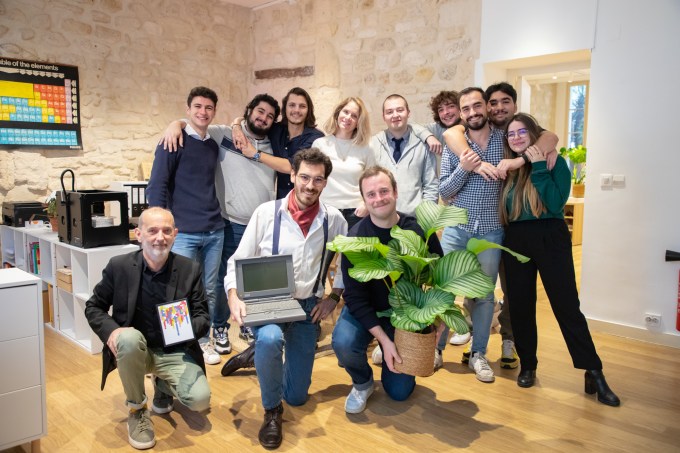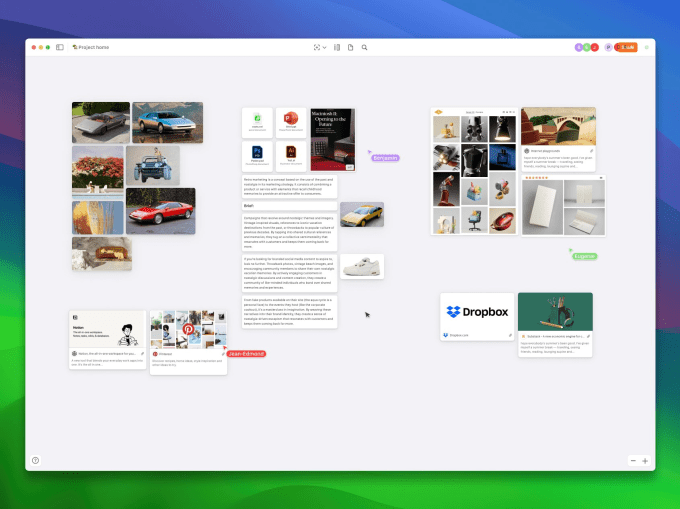In recent years, tools such as Figma, TLDraw, Apple’s Freeform and Arc browser’s Easel functionality have tried to sell the idea of using an “infinite canvas” for capturing and sharing ideas. French startup Kosmik is building on that general concept with a knowledge-capturing tool that doesn’t require the user to switch between different windows or apps to capture information.
Kosmik was founded in 2018 by Paul Rony and Christophe Van Deputte. Prior to that, Rony worked at a video production company as a junior director, and he wanted a single whiteboard-type canvas instead of file and folders where he could put videos, PDFs, websites, notes and drawings. And that’s when he started to build Kosmic, Rony told TechCrunch, drawing on a prior background in computing history and philosophy.
“It took us almost three years to make a working product to include baseline features like data encryption, offline-first mode and build a spatial canvas-based UI,” Rony explained. “We have built all of this on IPFS, so when two people collaborate everything is peer-to-peer rather than relying on a server-based architecture.”

Kosmik offers an infinite canvas interface where you can insert text, images, videos, PDFs and links, which can be opened and previewed in a side panel. It also features a built-in browser, saving users from having to switch windows when they need to find a relevant website link. Additionally, the platform sports a PDF reader, which lets the user extract elements such as images and text.
The tool is useful for designers, architects, consultants, and students to build boards of information for different projects. The tool is useful for them as they don’t need to open up a bunch of Chrome tabs and put details into a document, which is not a very visual medium for various media types. Some retail investors are using the app to monitor stock prices and consultants are using them for their project boards.

Rony emphasized that combining these different tools, and bringing them into one place, is Kosmik’s core selling point.
“I think that everything revolves around the idea that we do not have the best web browser, text editor or PDF reader,” Rony said. “But because we allow them to exist together in the same place, and you can drag-and-drop stuff in between them, the tool becomes extremely powerful.”
Available via the web, Mac, and Windows, Kosmik ships with a basic free tier, though this has a limit of 50MB of files and 5GB of storage with 500 canvas “elements.” For more storage and unlimited elements, the company offers a $5.99 monthly subscription, with plans in place to eventually offer a “pay-once” model for those who only want to use the software on a single device.
Double down
Kosmik also today revealed that it has raised $3.7 million in a seed round of funding led by Creandum, with participation from Alven, Kima Ventures, Betaworks and founders from Replit and Quizlet.
Hanel Baveja, principal at Creandum, told TechCrunch that the firm decided to invest in Kosmik because it felt a little like Notion and Miro, with the potential to build something that changes the workflows of organizations entirely. However, Baveja said that the startup will have to create immediate value for users, just like any consumer tool in the space.
“Your time-to-value in any product has to be immediate; you only get one chance to pull in a user, especially when you aim to become a daily product,” Baveja said. “Finding the balance of a rich feature set, with ease-of-adoption is certainly one challenge and an area where the Kosmik team has continued to double down.”
This cash injection is also timely, given the product iteration in the pipeline. Indeed, Kosmik is in the process of merging its codebases, with Kosmik 2.0 bringing feature parity to the mix — the new app will be web-based, with the desktop clients essentially wrapper apps.
Moreover, the new version will include features such as multiplayer collaboration and AI-powered auto-tagging for items in images.
Rony said that with the multiplayer mode, instead of sharing the whole board, you can collaborate with someone on just a single part of the canvas using a folder-like “card” with objects dropped within it.
Kosmik opened to users in March, and currently claims around 8,000 daily users, though it said that it’s hard to specify the exact number of people actively using it given that they can work entirely offline with the product.
It’s worth noting that Kosmik isn’t the only startup working in the personal whiteboard space. Berlin-based Deta is building a new cloud OS for this and Sane is building a social knowledge-sharing platform. These companies will need to compete in some way to catch user attention and also convince them to try a new paradigm for knowledge capturing.































Comment